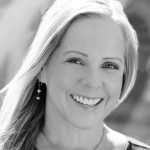“Gun Laws Won’t Impact Us Here” in the Line of Fire, Say Peace Workers: Part 4 of 4
Categorized as: Stories on July 28, 2013.
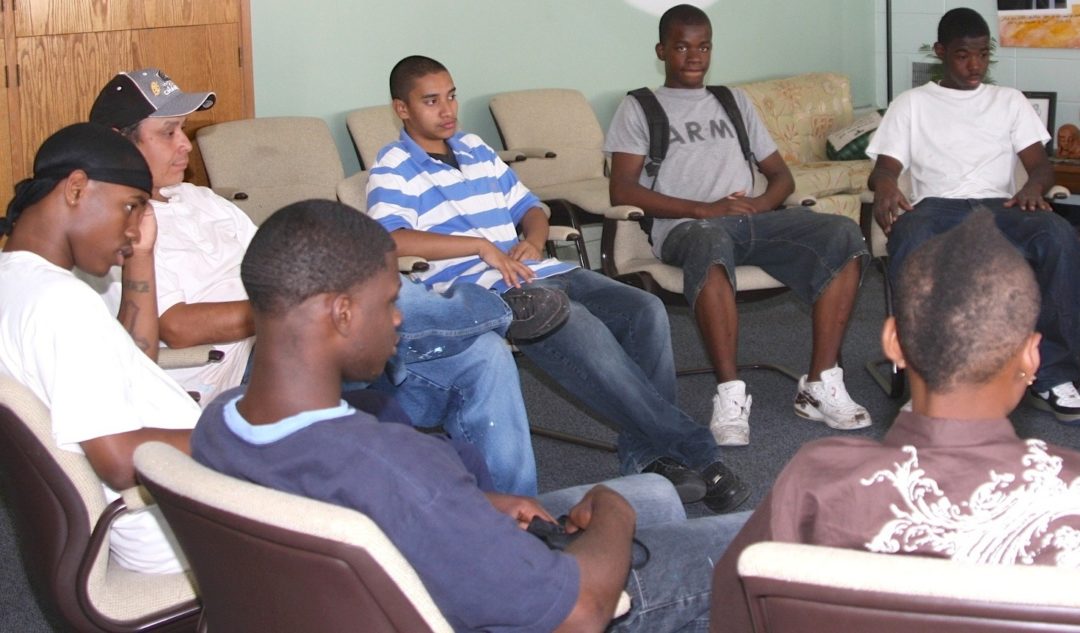
In Chicago, the U.S. city that suffers the highest rates of gun violence and murder, a small team of unlikely adults employs a surprising technique to try to keep their kids alive. Here in Part 4, we conclude our series with the voices of the young men themselves. Listen in on an informal peacemaking circle, where members from opposing gangs, and sometimes on opposite ends of a crime, talk about their struggles and dreams.
Read Part 1 here.
Read Part 2 here.
Read Part 3 here.
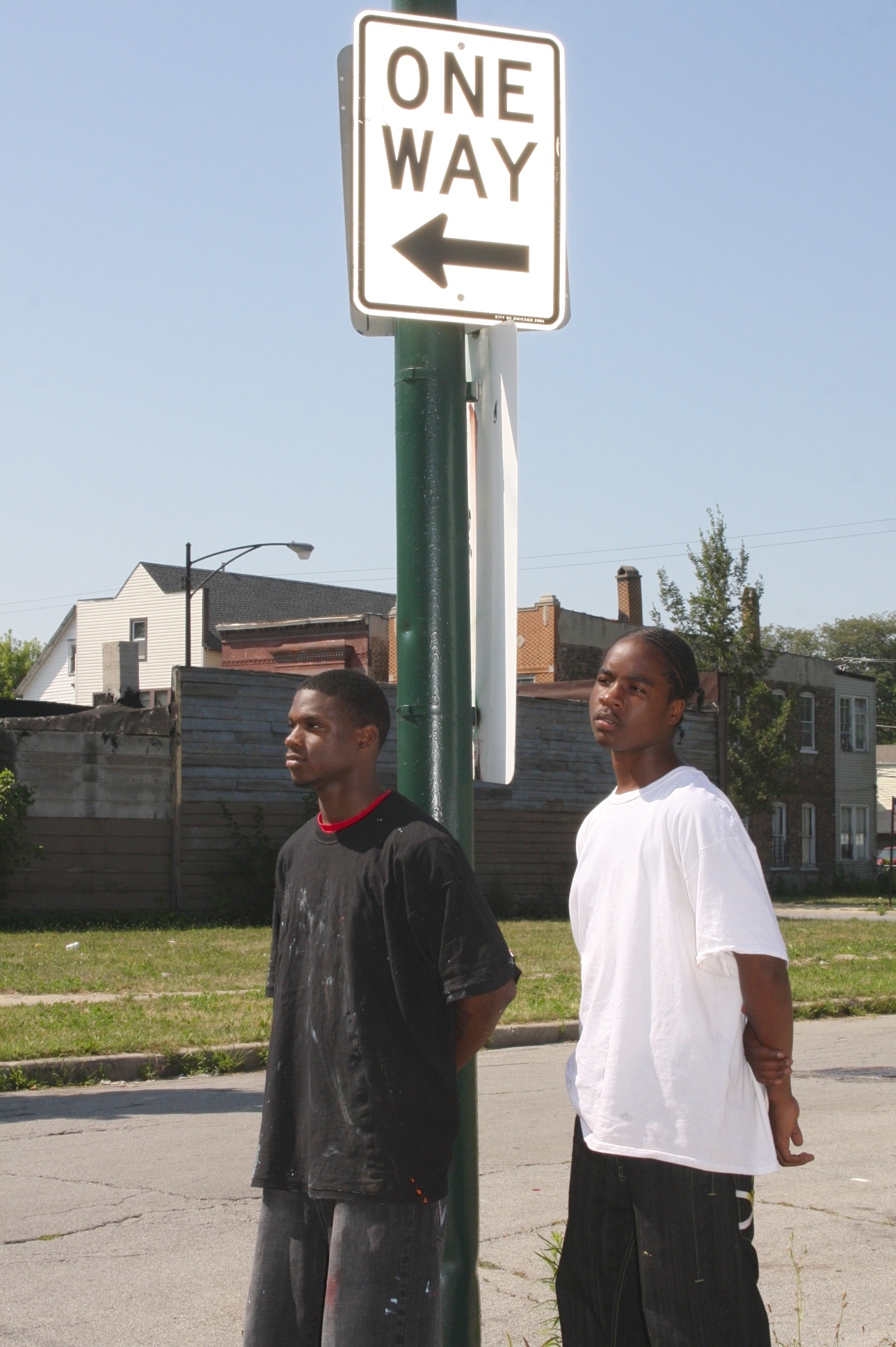
Getting Real Across Gang Lines
The PBMR Center has everything a teenage heart desires: snacks in the kitchen, sodas in the fridge, a flat-screen television, a couch, and a well-used pool table. The art studio offers space, supplies, and mentoring in sketching, painting, and ceramics; and a small exercise room offers weights and cardio equipment to get buff or blow off steam. What has become the favorite room of many of the fifty young people currently utilizing The Center, however, has nothing to do with recreation: It’s the “peace room” that brings victims and perpetrators, current and former gang members, friends and enemies, face to face.
Sometimes, it seems like life points in only one direction. The PBMR restorative justice and mentoring program is intended to show young men like these two members alternate paths in life.
Members have created their own rules for the peace circle; for example, only one member holds an object (e.g., a stone painted with the word “peace”) and speaks until finished, uninterrupted. Occasionally, the group erupts into a chorus of comments—not because they’re disagreeing with each other, but because of their passion about the topic. Now that someone’s listening, they have a lot to say.
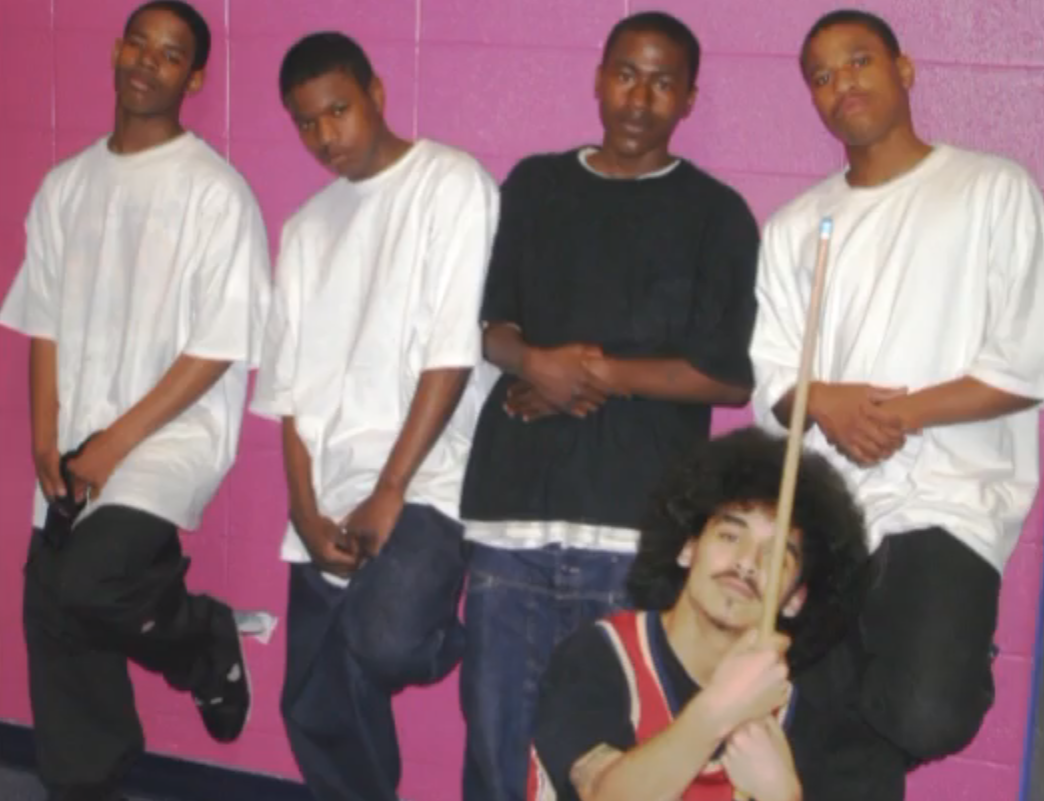 PBMR members shooting a little pool.
PBMR members shooting a little pool.
“Coming here, you know, it’s like I’m just trying to stay out of trouble,” grins 24-year-old Anthony, who’s done time for drug dealing. “I’ve been supporting myself since about eighth grade,” he says, adding that’s typical of low-income Chicago males: A sort of rite of passage is that upon reaching adolescence, their primarily unemployed, mostly single-mother parents, expect them to cover their own expenses. If that includes a bus fee to get to high school, many will drop out. If that includes clothing and food in an environment without legitimate jobs, many turn to the most reliable employer of all: the drug market.
Joined by eight other young men and moderator Donna in the peace room, Anthony articulates how difficult it is to keep clean. “Police always be hopping out on you,” he says with an encompassing sweep of his right arm. ““I mean, you can just be in front of a friend’s house, or in a public restaurant, and they’ll pull you out for trespassing. If you don’t react with respect you will get on their bad side.” He looks around the circle where almost every member has been arrested and served time for crimes they may or may not agree to have done. “And you know, the closest get the most-est,” he says, referring to the length of sentence served by whoever is caught closest to the scene of a crime.
“True that,” his companions agree.
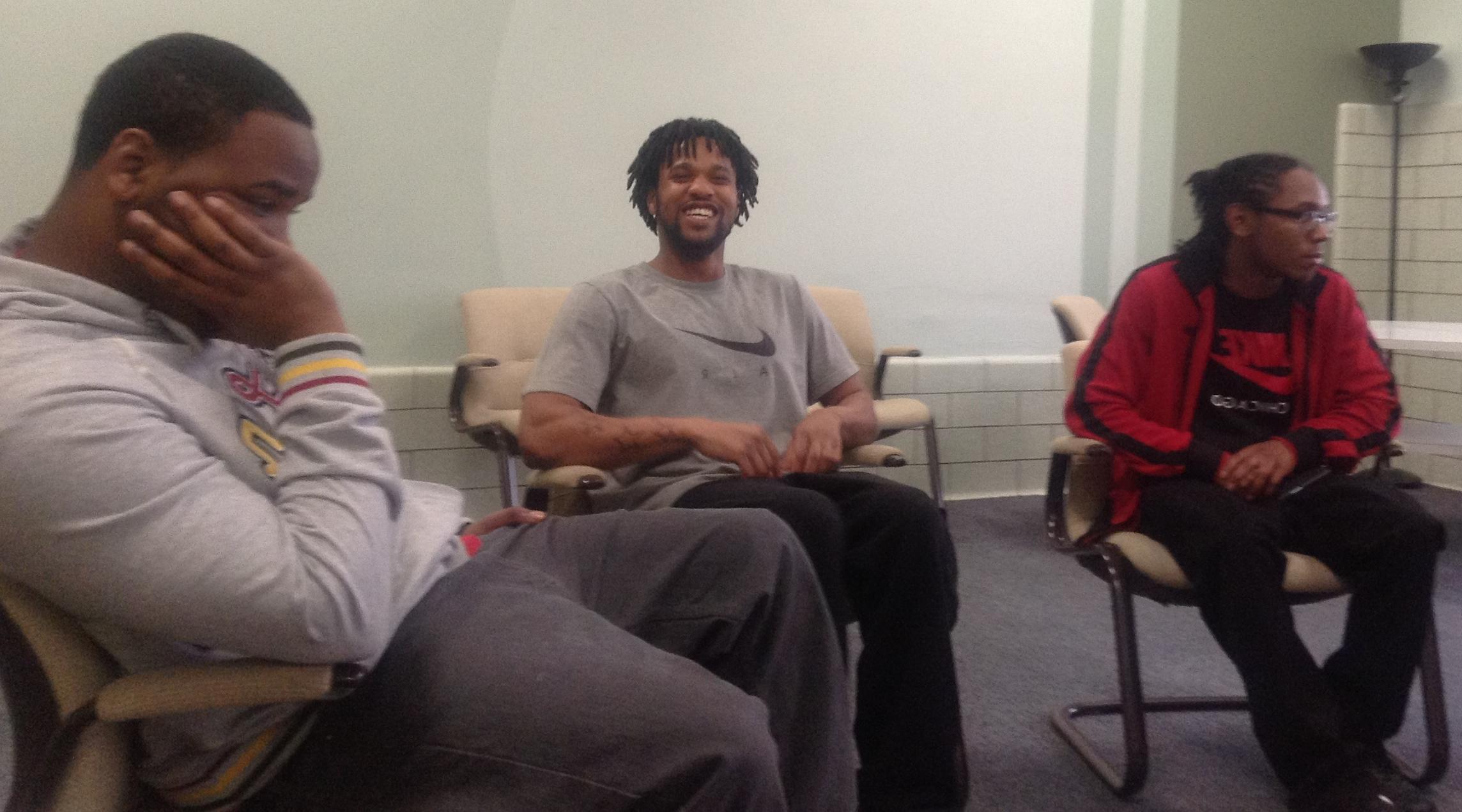 Members share ennui, angst, anger, and jokes–all that’s real–with one another every week in circle.
Members share ennui, angst, anger, and jokes–all that’s real–with one another every week in circle.
Donna asks how much of the deck was stacked against him by being born a black male, and Anthony’s complex response receives head-nods of agreement all around the circle: “Being a black male, it’s implanted in your mind from as far back as you can remember” to violate laws, self, and others—but he acknowledges that he still has power over his choices every day. Anthony’s dream for his future is to transcend trouble with the law: “I’ll be legit. I’ll walk right past them and police will know they can’t mess with me.”
Rolando, one of the oldest members at age 24, says, “I’m still trying to get out of this and get my GED.” He shakes his red-tipped Dreadlocks for emphasis. “Blame nobody but yourself for what you do. For example, it’s my fault I chose not to go to school. I didn’t take the right way. It’s mostly our fault when we get in trouble with the police: We selling drugs and so forth. Then the police know our face, and they gonna pull us aside.” He says he has a good family. “My mama works at the hospital, and my daddy’s at home. But sometimes, I think, it takes jail to get people to know they want to get off the street.”
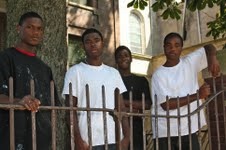
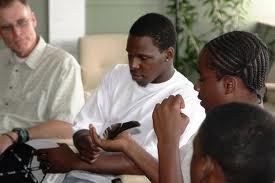 Being a black male in the U.S., especially in urban centers such as Chicago, can leave young men feeling hopeless. Peacemaking circles create a space where their voices are heard and respected.
Being a black male in the U.S., especially in urban centers such as Chicago, can leave young men feeling hopeless. Peacemaking circles create a space where their voices are heard and respected.
When Rolando was just 14, he witnessed his older brother Leon, then 17, get into a scuffle with another boy—who got shot and died. “That was the hardest moment in my life. He wasn’t trying to hurt the guy who got killed . . . and he got 35 years!” His hands fly up and apart, then flutter back down into his lap. “You know, I be scared half the time; that’s the truth.”
These young men, determined to break negative patterns all around them, come to the peace room to forgive themselves and one another and learn new ways to be men. One member who had to quit school due to severe schizophrenia sits next to another member who holds down a rare, cherished fulltime job at a health store.
Twenty-year-old Lamonte, who’s lucky to work as a youth mentor right here at The Center, lights up when he talks about his four-month-old daughter, La’Kota. “She is the joy of my life,” he gushes. Until he scored steady employment here, Lamonte, who just got out of prison for gun possession, couldn’t find a legitimate way to earn cash. “If you one of the oldest kids in the crib,” he says, “there ain’t no jobs out there, and you ARE going to sell drugs to make some money to help out the family.”
Lamonte realizes the double bind here: What may appear to be easy money has a very high price attached—not just with police and prison. “You could be robbed at any time. You’ll either kill or be killed, at some point. It’s too high-risk,” he says.
Donna, like all the staff members at The Center, doesn’t agree, disagree, or problem-solve for any of the young men. “We aren’t police officers, judges, medical staff, or counselors,” she says. “We feel our job is just to listen and acknowledge.”
One of the quiet members of the circle, Ronald, navigates daily a family full of needs. His twin brother has schizophrenia, and his mother is addicted to crack. He has no father, so they live with Ronald’s grandma, who tries to care for them but gets drunk every day by 3:00. When Ronald was 17, he got shot—and in this close community, not only does he know the perpetrator, he sees him almost every day. “The hardest thing in my life is not retaliating on him,” Ronald says, head down.
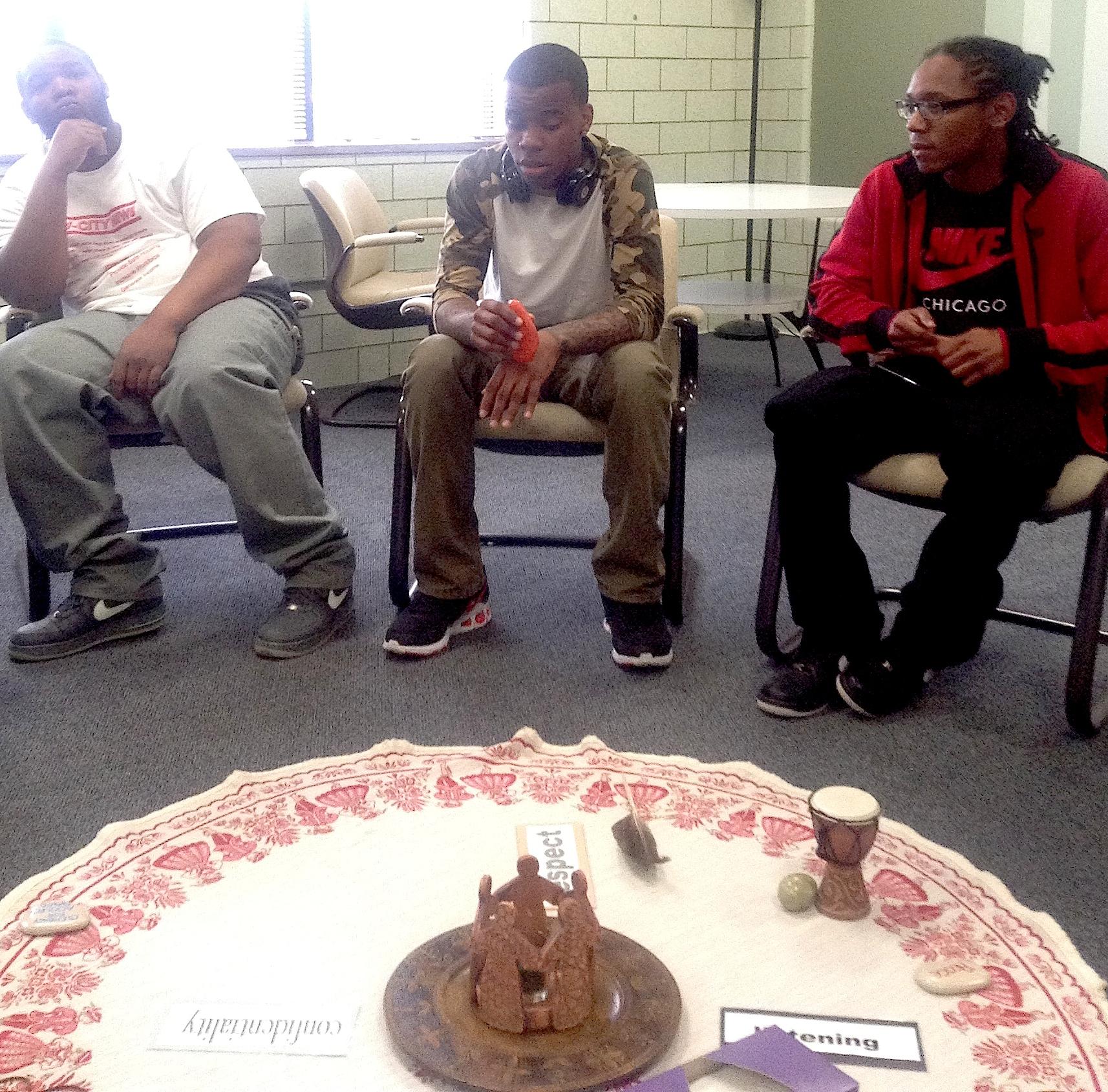 Philip (center) holds the “talking stone” as he describes his commitment to full-time work and college classes.
Philip (center) holds the “talking stone” as he describes his commitment to full-time work and college classes.
21-year-old Phillip has an older brother named Priest who’s in jail for five felonies, including manslaughter. Phillip sees his choices with stunning clarity. “It’s hard not to get sucked into the gangster life, like my brother did,” he shrugs. “But the retirement plan is not what you want. I could end up dead.”
Instead, Phillip scored a full-time job working at a health food store. The other members look to him wistfully: He has stature and a steady paycheck. At the same time, when they do the math, they realize that for 40 hours of work per week, Phillip earns $800 per month, whereas they could earn $1,000 a day selling narcotics.
“I grew up in the neighborhood,” agrees Jonathan, “and when I was 14 my mom stopped buying stuff for me. No bus fare to get to school. I done did my dirt. Now, I’m trying to climb my way back up out of there. I struggle, financially and mentally. Being around new crowds, I hold back.”
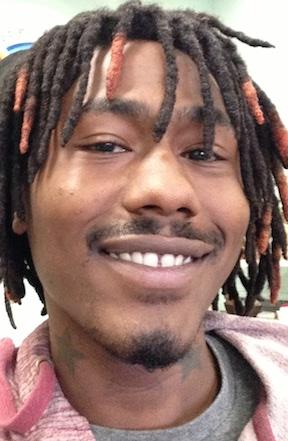 Rolando wants to get his GED and get on with his dreams for college, a job, and a family.
Rolando wants to get his GED and get on with his dreams for college, a job, and a family.
Having served time in the county jail for theft, Jonathan tries to see the bright side of what he put himself through. “Getting locked up—I don’t ever want to go through that again. I want to focus on the long-term rather than the short-term.” He met a girl “whose parents give her everything and it made me realize, that’s not good for you either because then you don’t learn.” His vision for his neighborhood: to bring more jobs into the community and help residents “make better choices” and for himself, Jonathan wants wealth and happiness.
Phillip takes the talking stone and says he, too, dated a girl from outside the neighborhood. “She didn’t believe my stories about all the shootings and violence here,” he tells the guys, “until one night when we were talking on the phone and she heard gunshots behind me.” To Phillip, no one can really know what life is like here until they experience it firsthand. “These rich people, they gotta worry about getting they Bentley oil change and stuff. We should take rich kids and politicians and bring them down here,” he suggests. “Put them in our shoes.”
Talking about shoes, 21-year-old Lowdell brings the conversation back to the here and now. “My dream is to have new clothes, and a new pair of shoes,” he says wistfully. “I just want to be kind of rich, have money, stay stable, have good health.”
They don’t have a concrete plan for how to earn it, but everyone agrees they want money. “Truth is, money rules 95% of the world,” gushes Rolando. “And in this neighborhood, if you don’t have money, ain’t nobody want to talk to you.” He looks around to the others’ faces for support. “You don’t get no girls; you don’t get no respect.” The whole circle laughs and nods in agreement.
Gunshot victim Ronald wants, more than anything else, “for people just to get along. I want people from different blocks and gangs to come together in circles like this one, and just talk.”
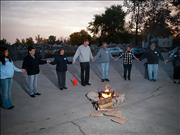 A peacemaking circle with community members, held outside The Center around a bonfire.
A peacemaking circle with community members, held outside The Center around a bonfire.
Dreaming of a Different Kind of Future
A key element to peacemaking circles, and perhaps to the success of restorative justice, is to ask participants, “What do you want?” Turns out, the young men of The Center have clear visions for how their lives will look in ten years.
The life Rolando wants for himself isn’t grand—“just for money not to be an issue, not to starve or worry.” He’d like to stay here in Chicago and “help clean up the neighborhood.” He sees potential in the rundown houses all around him. “We could fix up these boarded-up houses, build stores on these empty lots, paint up the buildings and replace the broken windows. We could fill every [empty] lot” with thriving shops and businesses,” he suggests.
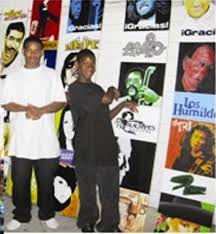
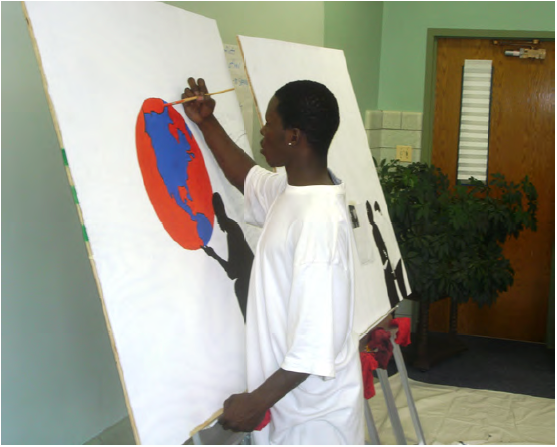 PBMR members take pride in their art. They’d like to clean up their neighborhood, paint the buildings, and replace broken windows–then fill abandoned buildings with thriving shops and businesses.
PBMR members take pride in their art. They’d like to clean up their neighborhood, paint the buildings, and replace broken windows–then fill abandoned buildings with thriving shops and businesses.
“I’m going to be single, man,” jokes Ronald, “I won’t let no female slow me down! I’m going to have a degree and go to a job that I love every day. I’m going to be a lawyer.”
Rolando will have earned his GED and will be working, with “just enough money to be OK. I don’t want everything, ‘cause then it would be boring.” He wants to get married with “a big church wedding” and have one or two kids.
Lowdell, who at first just wanted new shoes, now adds, “I’m going to have a LOT of cash.” He used to be one of the brightest boys in school, but now at age 21 Lowdell struggles with schizophrenia and cannot work or attend classes. He spends most of his days at the Center, shooting pool and hanging out with the guys he considers his best friends. His future dream includes success, “even if I’m selling drugs. OK, maybe I’ll get a degree and work—whatever it takes. I’ll be rich. I’ll get out of my parents’ house and move into my own house, a three-bedroom.”
His brother Lamonte chimes in: “I’ll have a nice career, nice job, and a car.” This sounds feasible for him, since he’s already employed at The Center, building his resume, and chipping away at community college.
Vashon, the Center’s youngest member at age 15, wants a Lamborghini. He plans to marry and have two children, and he’ll have “a good career.” He’s the only one who plans to leave Chicago. “Oh yeah,” he says with emphasis, “I’ll be moving out of Chicago. I’m going to Miami. You can see me now, strolling the beach,” he adds with a chuckle.
“Yeah, well, I’m going to be on welfare and have six kids in ten years,” says Phillip with a straight face. He pauses for a second and then laughs. “Joke!” He is, actually, one of the most likely to succeed, given his current choices to complete school and work fulltime. “In truth, I’m going to have a money vault in my house the size of this room!” Phillip says exuberantly, throwing both hands up to amplify his point. (The peace room is 600 square feet.)
Jonathan may not get married, but he sees himself in a steady relationship with two children and “not a mansion but a nice house, a car. I’ll have a career in something I like to do, and a college degree in the nursing field.” Already enrolled in nursing school, Jonathan seems on track. “We’ll have a stable life. My kids don’t want for nothing.”
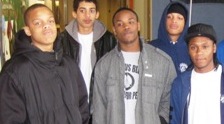 What do the young men of Chicago’s PBMR Center want? Surprise: The American Dream.
What do the young men of Chicago’s PBMR Center want? Surprise: The American Dream.
The common thread throughout the comments: stability. Each young man talks first about family—taking care of his family of birth or marriage—and then taking care of himself, whether by driving a fancy car or buying a 3-bedroom house. These young men may have grown up in the line of fire, but their dreams soar far beyond.
They want what Americans have always wanted: the chance to build a good life, with their own two hands and their creative minds. Maybe their words only float over their heads and dissipate into the peace room. Or maybe, because they dare to speak their dreams not once but many times, and someone listens, they’ll find the heart within to stay steady and make them come true.
Darius Clark, Center member and musical artist, offers his version of “Fairy Tale” in this song.
What’s working in Brooklyn, New York? A 100% successful year-old program called “Man Up.” Read about this innovative program utilizing volunteer peers to keep the peace, here.
Photographs courtesy of PBMR and Suzanne Skees.
LEARN more about The PBMR Center’s holistic care of at-risk and incarcerated youth here.
SHARE this story with your networks; see menus at top of page and below this list.
DONATE directly to provide more youth and families with a safe space to heal, here.
SUBSCRIBE! Like what you see? Click here to subscribe to Seeds of Hope!

